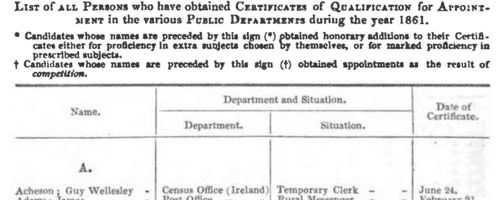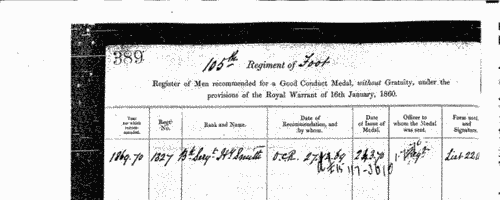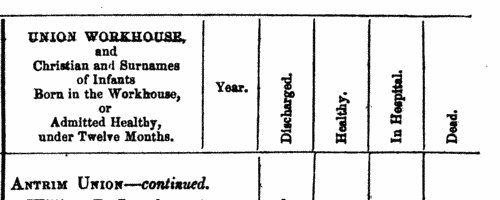Add this eBook to your basket to receive access to all 198 records. Our indexes include entries for the spelling condon. In the period you have requested, we have the following 198 records (displaying 81 to 90): These sample scans are from the original record. You will get scans of the full pages or articles where the surname you searched for has been found. Your web browser may prevent the sample windows from opening; in this case please change your browser settings to allow pop-up windows from this site.  British infantry fighting in China
(1860) British infantry fighting in China
(1860)
The China Medal was awarded to soldiers and sailors who took part in the prosecution of the war against the Chinese from 1856 to 1860. Separate clasps were awarded for men who had been in receipt of the China Medal of 1842; for being actually present at Canton on 28 and 29 December 1857, when that city was bombarded and finally captured; for being actually engaged in the operations which ceased with the first capture of the Taku Forts, 20 May 1858, and led to the Treaty of Tientsin; for being actually present at the capture of the Taku Forts 21 August 1860; and for being actually present before Pekin the day the gate of that city was given up to the allied (British and French) army, viz. on 13 October 1860. The 44th (The East Essex) Regiment of Foot, based at Colchester, having returned from the Crimea, embarked for India 26 August 1857, and was transferred thence to China. The regiment took part in the capture of the Taku Forts. | Sample scan, click to enlarge

| Civil Service Appointments
(1861)
The Civil Service Commission published an annual list of all persons who had obtained certificates of qualification for appointment in the various public departments. The list gives full name (surname first); department (such as Post Office, or Inland Revenue); situation (such as Letter-carrier, or Clerk); and date of certificate. Candidates whose names are preceded by a dagger obtained appointments as the result of competition; a double dagger indicates open competition. Those whose names are preceded by an asterisk obtained honorary additions to their certificates either for proficiency in extra subjects chosen by themselves, or for marked proficiency in the prescribed subjects. Then follows a further list of these candidates who had obtained Honorary Additions to their Certificates in this way: giving name (surname and initials); position in the service (department and situation); subjects for which honorary additions were made; and 'extent of knowledge displayed' (such as Creditable, Fair, or Very Creditable). 1 January to 31 December 1861. | Sample scan, click to enlarge

| Long-stay Paupers in Workhouses: West London
(1861)
This comprehensive return by the Poor Law Board for England and Wales in July 1861 revealed that of the 67,800 paupers aged 16 or over, exclusive of vagrants, then in the Board's workhouses, 14,216 (6,569 men, 7,647 women) had been inmates for a continuous period of five years and upwards. The return lists all these long-stay inmates from each of the 626 workhouses that had been existence for five years and more, giving full name; the amount of time that each had been in the workhouse (years and months); the reason assigned why the pauper in each case was unable to sustain himself or herself; and whether or not the pauper had been brought up in a district or workhouse school (very few had). The commonest reasons given for this long stay in the workhouse were: old age and infirm (3,331); infirm (2,565); idiot (1,565); weak mind (1,026); imbecile (997); and illness (493). | Sample scan, click to enlarge

| New South Wales Intestates
(1861)
The probate courts of the Australian colonies furnished returns of estates of deceased intestates, giving full name, colonial residence, supposed British or foreign residence of family (often unknown, or left blank), amount of the estate and how much had been disbursed and how. The date of death is often stated, and if by accident, suicide or crime. Names were carried forward from return to return until the estate was expended or exhausted. | Sample scan, click to enlarge

| Civil Service Appointments
(1862)
The Civil Service Commission published an annual list of all persons who had obtained certificates of qualification for appointment in the various public departments. The list gives full name (surname first); department (such as Post Office, or Inland Revenue); situation (such as Letter-carrier, or Clerk); and date of certificate. Candidates whose names are preceded by a dagger obtained appointments as the result of competition; a double dagger indicates open competition. Those whose names are preceded by an asterisk obtained honorary additions to their certificates either for proficiency in extra subjects chosen by themselves, or for marked proficiency in the prescribed subjects. Then follows a further list of these candidates who had obtained Honorary Additions to their Certificates in this way: giving name (surname and initials); position in the service (department and situation); subjects for which honorary additions were made; and 'extent of knowledge displayed' (such as Creditable, Fair, or Very Creditable). 1 January to 31 December 1862. | Sample scan, click to enlarge

|  Men of the 57th Regiment who fought in the New Zealand War
(1860-1870) Men of the 57th Regiment who fought in the New Zealand War
(1860-1870)
New Zealand War Medal roll for the 57th (The West Middlesex) Regiment of Foot: for service in the New Zealand campaign 1863 to 1867: the rolls were compiled following a general order in 1869 and the medals were distributed in 1870. The regiment had been serving at Poonah in India, and was moved to New Zealand in November 1860; the men returned to England in April 1867. | Sample scan, click to enlarge

|  Outstanding soldiers of the 41st regiment of Foot
(1860-1870) Outstanding soldiers of the 41st regiment of Foot
(1860-1870)
The 41st (The Welsh) Regiment of Foot embarked for Jamaica in 1857. It was serving in Jamaica in 1860. The regimental depot was at Devonport. Each year just a handful of outstanding soldiers of the regiment were chosen for good conduct medals and gratuities: these are listed here. There were two lists, one for men recommended for the Good Conduct Medal without a gratuity, and one for gratuities - £5 to a private, £10 to a corporal, and £15 to a serjeant. Both lists are indexed here, and each gives rank, name, regimental number, date of recommendation and date of issue. (The sample scan is from the 105th foot) | Sample scan, click to enlarge

|  Men of the 14th Regiment who fought in the New Zealand War
(1863-1870) Men of the 14th Regiment who fought in the New Zealand War
(1863-1870)
New Zealand War Medal roll for the 2nd battalion of the 14th (Buckinghamshire) Regiment of Foot: for service in the New Zealand campaign 1863 to 1867: the rolls were compiled following a general order in 1869 and the medals were distributed in 1870. The 2nd battalion, despite being part of the Buckinghamshire Regiment, was raised at Mullingar in Westmeath in 1857, and was sent to New Zealand in 1860, where it took part in the war of 1863 to 1865. In 1866 the men were sent to Australia, returning to England in 1870. | Sample scan, click to enlarge

|  Men of the Durham Light Infantry who fought in the New Zealand War
(1864-1870) Men of the Durham Light Infantry who fought in the New Zealand War
(1864-1870)
New Zealand War Medal roll for the 68th (Durham Light Infantry) Regiment of Foot: for service in the New Zealand campaign 1863 to 1867: the rolls were compiled following a general order in 1869 and the medals were distributed in 1870. The regiment embarked for India in December 1857, served in Burma, and was moved to New Zealand in 1864; the men returned to England in 1866. | Sample scan, click to enlarge

| Infants in Clonmel Workhouse: Tipperary and Waterford
(1872)
Return, “with Christian and Surname of each, of Infants Born in Irish Workhouses, or Admitted thereto when Healthy under Twelve Months Old, and attempted to be Reared therein during the Years 1872 to 1874, showing what has since become of them”. The returns from each poor law union workhouse give: Christian and Surname of Infant Born in the Workhouse, or Admitted Healthy, under Twelve Months; Year; and whether discharged, healthy, in hospital, or dead. | Sample scan, click to enlarge

|
Research your ancestry, family history, genealogy and one-name study by direct access to original records and archives indexed by surname.
|












